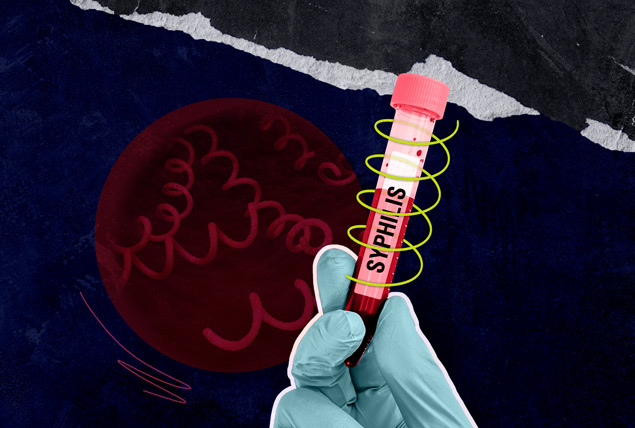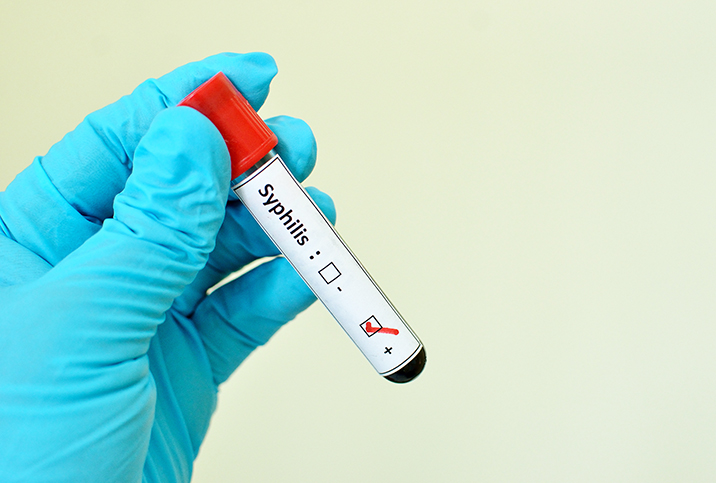How to Diagnose and Treat Syphilis

Syphilis is a sexually transmitted disease (STD) caused by the bacteria known as Treponema pallidum. Once a person is exposed to this spiral-shaped organism, the infection develops in stages, and the only way to halt its progression is with treatment.
In clinical practice, penicillin is generally the first option used to cure syphilis at all stages, when discovered or diagnosed.
It is important to understand, though, that a person with syphilis may not always know they have it, and it is common for a patient to be asymptomatic. Not all stages of syphilis exhibit the same symptoms and some of them don't exhibit any at all. The four stages of syphilis, and their unique ways of expressing themself, are:
- Primary stage
- Secondary stage
- Latent stage
- Tertiary stage
The stages of syphilis
The primary stage is characterized by a single "chancre," a circular lesion that appears at the site of the initial infection. On average, it takes three to four weeks from exposure to the development of this ulcer. It usually appears on the lips or mouth, anus, penis or vagina, but it could appear anywhere on the skin.
Seeing multiple chancres is rare but more likely to happen if a person has human immunodeficiency virus (HIV), according to published research.
A chancre is usually painless and may go unnoticed if it appears in an area not easily accessible or visible—such as the anus or vagina. They typically take three to six weeks to heal, regardless of whether treatment is received, according to the Centers for Disease Control and Prevention (CDC). Anyone who doesn't notice their syphilitic chancre will likely progress to the secondary stage of syphilis.
Secondary stage of syphilis
While the primary stage often goes unnoticed, the secondary stage is much more difficult to ignore. At this point, syphilis has become a "bacteremia," or a bloodstream infection.
Some people with syphilis may feel or notice the chancres more than others, according to Dana Dunne, M.D., M.H.S., an associate professor of medicine, infectious diseases, at Yale School of Medicine in Connecticut and the founding and core faculty member for the Yale Primary Care HIV Training Track.
"For example, if your primary lesion is in the cervix or in the anal area, since these ulcers are classically painless, people might not notice this primary stage," Dunne said. "And it'll heal up and go away without their knowledge. So if patients are going to recognize any stage of the illness, it's often the secondary stage given that rash and lymph node swelling is easier to see."
The two most common symptoms of secondary-stage syphilis are a widespread maculopapular rash throughout the body and a fever. The rash is typically seen as red dots or bumps on the torso, palms and feet. Additionally, gray warts known as "condylomata lata" may appear along the genital or anal regions.
"Some patients might feel quite sick in the secondary stage with fever and lymph node swelling, and a significant rash, whereas others might just have a small patch of a rash," Dunne said. "You should definitely seek attention for any of these symptoms, especially in the context of being sexually active.
"Importantly, any of the neurologic symptoms like blurry vision or sudden hearing loss or dizziness, double vision or a facial droop, should prompt an urgent visit to a healthcare provider, because, if related to syphilis or not, a delay in diagnosis can result in irreversible, neurologic deficits, including blindness."
Secondary-stage syphilis may lead to what is known as vasculitis. This refers to an inflammation of the blood vessels caused by an immune response to the syphilitic bacteria that are flowing through the blood.
Although rare, this may result in inflammation in the eyes, liver, kidneys and nervous system. Such severe complications during secondary-stage syphilis occur in less than 10 percent of patients.
Similar to primary-stage symptoms, secondary-stage symptoms will likely dissipate after three to six weeks. However, the underlying syphilitic bacteria in the bloodstream will remain in the system and enter a latent stage.
Latent and tertiary-stage syphilis
Following the secondary stage, the latent stage is a period when the bacteria will lie dormant in your body. Although there might be an occasional "flare-up" of secondary-stage symptoms, sometimes persisting for up to two years, there may be little other evidence of syphilis. However, if treatment is not administered at this point, syphilis will quietly remain in the system, and there is a 35 percent chance the disease will progress to the tertiary stage within five to 20 years.
The tertiary stage of syphilis can cause disability, irreversible organ damage and death.
How can you be screened for syphilis?
"Depending on where you seek care, testing for syphilis may vary but by and large involves a blood test," Dunne said. "Some clinics have access to rapid syphilis testing, which would give you results in 15 to 20 minutes. But most have a one- to two-day turnaround time as the lab has to put the blood through a series of confirmatory tests to give the practicing clinician enough information to make an accurate diagnosis."
This test is widely available, she continued, and seeing a provider with whom you have established care is always preferable. If this isn't practical, good sexual health expertise can be found at Planned Parenthood clinics, city- and state-run STI clinics, and clinics that specialize in LGBTQIA+ healthcare.
"Whatever healthcare venue a patient seeks out, it is strongly recommended that information is shared about sexual activity along with any other information that may be unique, such as how much you travel, occupational exposures and so on," Dunne added. "Not all the healthcare providers are equally comfortable with obtaining a sexual history from patients and, especially if the symptom is something that does not scream STI—like a rash or hair loss or even blurry vision—they might not even think about syphilis or other STIs in the list of possibilities or think about testing for it."
Treatment guidelines
Treatment of syphilis depends on the stage. The guidelines for treatment may differ between countries, but according to the CDC, the recommended treatment courses for the United States are as follows.
Primary and secondary stage syphilis
First-line treatment option: Penicillin G benzathine
Dosage: 2.4 million units of intramuscular injection (single dose)
Second-line treatment option: Doxycycline
Dosage:100 mg taken twice daily for two weeks
Third-line treatment option: Ceftriaxone
Dosage: 1 to 2 grams daily for 10 to 14 days either through intramuscular or intravenous injection
Penicillin is the first-line treatment option, but there are alternate options that are typically only reserved for people who are allergic to the antibiotic. Keep in mind that these recommendations are for nonpregnant adults and do apply to HIV-infected adults, too.
Early latent-stage syphilis
This follows the same dosage of penicillin G benzathine recommended for the primary and secondary stages. If the clinician is unsure whether the patient is at an early or late latent stage, they may err on the side of caution and administer treatment assuming it is the late latent stage.
Late latent-stage syphilis
First-line treatment option: Penicillin G benzathine
Dosage: 7.2 million units administered as 2.4 million-unit doses given once a week for three weeks (through intramuscular injection)
Second-line treatment option: Doxycycline
Dosage: 100 mg taken twice a day (orally) for 28 days
Tertiary-stage syphilis
Treatment guidelines depend on the specific manifestation of the tertiary stage, which can vary greatly between patients, with dosage largely at the discretion of the clinician. However, the following are the most used treatment options when treating syphilis in its tertiary stage:
- Aqueous crystalline penicillin
- Penicillin G benzathine
- Penicillin G procaine and probenecid
While these will eliminate the syphilis bacteria, any organ or nerve damage caused during the tertiary stage may be irreversible.
Penicillin remains the preferred treatment
Primary, secondary and latent-stage syphilis treatment is fairly straightforward.
According to Barbara Bawer, M.D., a family medicine physician at the Wexner Medical Center, part of Ohio State University, Columbus, a single injection of benzathine penicillin G can be used to cure syphilis in the early stages.
"You may need more doses if you have latent syphilis," Bawer said. "Side effects of the injections are not very common but can include cardiac problems, skin reaction especially at the site of the injection, upset stomach or even infection of the stomach, and blood in the stool."
"As long as a patient does not have a severe penicillin allergy, intramuscular penicillin remains the preferred treatment for all stages of syphilis unless someone has symptoms involving the eyes and ears, or neurologic involvement," Dunne noted. "In those cases, penicillin is still the treatment of choice, but to get concentrations of the antibiotic high enough in the brain to be effective, penicillin has to be given intravenously."
Fortunately for patients, they don't have to be in the hospital to receive IV penicillin, if they are otherwise stable, Dunne added. Outpatient IV therapy is standard practice when treating many conditions that require IV antibiotics. Patients with a severe penicillin allergy can be given doxycycline pills that are taken for two or four weeks, depending on the stage.
Primary ulcers and secondary rashes resolve on their own or with penicillin, although some complications can prove permanent, she continued.
"Ocular (eye) and otic (ear) symptoms and signs are readily reversed with penicillin if patients come to attention quickly," she added. "A delay can result in permanent visual or hearing impairment or loss. Neurologic involvement with syphilis can also lead to a stroke—although, typically, years after acquired syphilis has been left untreated—which can be associated with permanent deficits.
"Lastly, in the pre-antibiotic era, late neurologic syphilis—and we're talking about decades after acquired syphilis has been left untreated—could result in difficulty walking, shooting electric pain down the legs, foot drop, balance problems, personality changes and dementia sometimes leading to death."
Get professional help
If you suspect syphilis, visit your doctor immediately for screening and potential treatment so disease progression can be halted as early as possible. It's important to practice safer sex to mitigate the risk of transmission. Keep in mind syphilis can be contracted more than once, regardless of whether a person had been infected and treated in the past.
"If the clinician feels your symptoms are compatible with syphilis, they may choose to treat you even before the results come back," Dunne said. "It will be important to review the final results of your blood testing since, ideally, you would want to notify any [sexual] partners you might've been with over the past few months for them to get checked as well.
Anyone with syphilis will need to return for a follow-up blood test to monitor how effective the therapy has been.
"Penicillin is still highly effective and this is an infection that can be totally cured," Dunne said. "The doctors or providers should also test you for STDs and STIs at the same time, including for chlamydia, gonorrhea, HIV and, for people with vaginas, trichomoniasis."


















